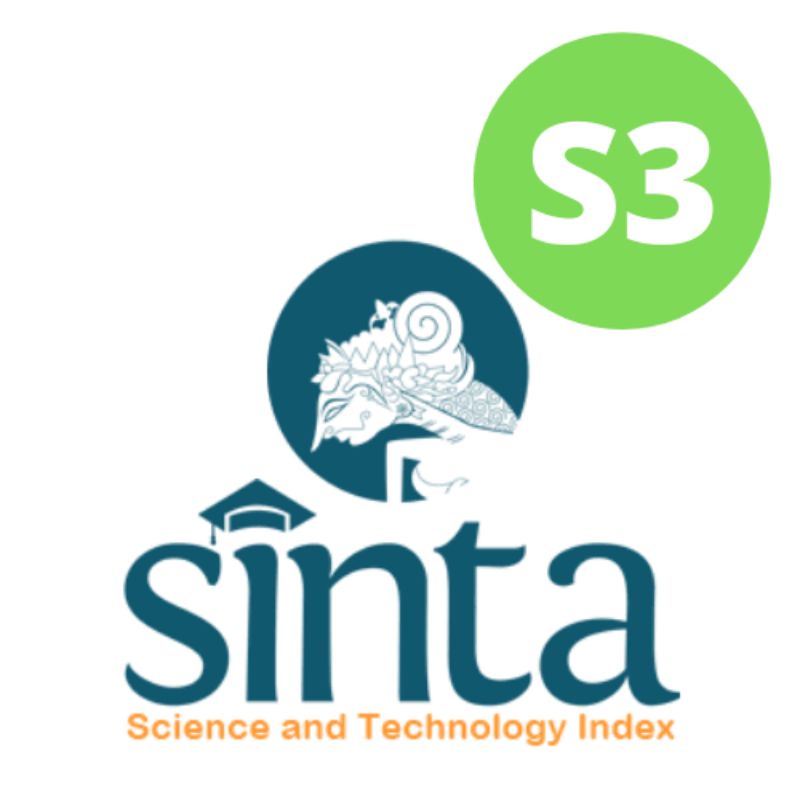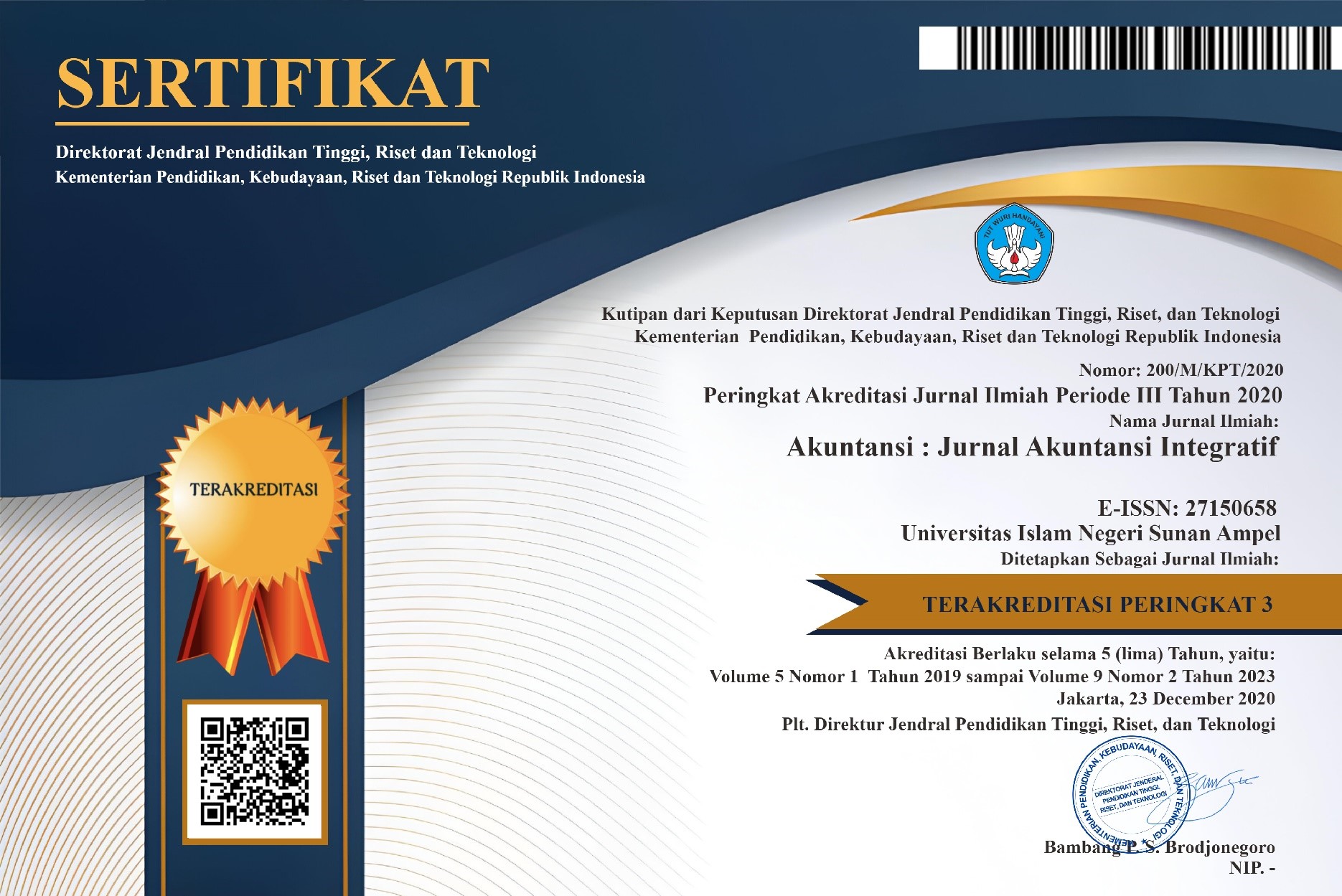Perbandingan Pengungkapan Identitas Etika Islam pada Perbankan Syariah Indonesia: Studi Pada Periode 2014-2018
DOI:
https://doi.org/10.29080/jai.v8i2.424Keywords:
Full-fledge Islamic banks, Islamic windows, Ethical Identity Index (EII)Abstract
The study aims to analyze the disclosure of Islamic ethical identity of full-fledge Islamic banks (BUS) and Islamic windows (UUS). This study also compares the full-fledge Islamic banks (BUS) and Islamic windows (UUS) which are better between the two groups. This study uses a sample of 12 BUS and 16 UUS in the period of 2014-2018. The sampling selection uses purposive sampling. This study examines the index of Islamic ethical identity disclosure using the Ethical Identity Index (EII). The results of this study indicate that full fledge Islamic banks (BUS) and Islamic windows (UUS) are no significant differences in the disclosure of. This study also discusses the disclosure on each dimension of EII.
Downloads
References
Afif, Z., dan Mawardi, I. (2014). Pengaruh Pembiayaan Murabahah terhadap Laba melalui Variabel Intervening Pembiayaan Bermasalah Bank Umum Syariah di Indonesia Periode 2009-2013. Jurnal Ekonomi Syariah Teori dan Terapan 1(8):565 580.http://dx.doi.org/10.20473/vol1iss20148pp565-580
Afifatus, A. S. (2012). Analisis Perbandingan Tingkat Kesehatan Antara Bank Umum Syariah dan Unit Usaha Syariah Di Indonesia. Unpublished Tesis: Sekolah Tinggi Ilmu Ekonomi Perbanas Surabaya.
Ajili, H., & Bouri, A. (2018). Corporate governance quality of Islamic banks: measurement and effect on financial performance. International Journal of Islamic and Middle Eastern Finance and Management, 11(3), 470–487. https://doi.org/10.1108/IMEFM-05-2017-0131
Aman, A. (2019). Islamic marketing ethics for Islamic financial institutions. International Journal of Ethics and Systems, 36(1), 1–11. https://doi.org/10.1108/IJOES-12-2018-0182
Apriliani Astuti, M., Dewi Y Rozali, R., & Cakhyaneu, A. (2019). Prevention of Fraud in Sharia Banking in Indonesia through Implementation of Sharia Corporate Governance. KnE Social Sciences, 3(13), 183–202. https://doi.org/10.18502/kss.v3i13.4205
Choir, U. (2019). Analisis PSAK 109 Terhadap Pengakuan, Pengukuran, Penyajian, dan Pengungkapan Dana Non Halal Periode Januari-Desember 2017 (Studi Kasus Pada LAZ Dompet Amanah Umat Sidoarjo). Akuntansi : Jurnal Akuntansi Integratif, 5(01), 71–88. https://doi.org/10.29080/jai.v5i01.157
Drissi, S., & Angade, K. (2019). Islamic Financial Intermediation the Emergence of a New Model. European Journal of Islamic Finance, 12(April), 1–7. https://doi.org/10.13135/2421-2172/2880
Ernawati. (2019). Studi Penyimpangan Internal pada Bank Umum Syariah di Indonesia. Indonesian Interdisciplinary Journal of Sharia Economics (IIJSE), 2(1), 32–46.
Farooq, M. O. (2007). Partnership , Equity-Financing and Islamic Finance : Whither Profit-Loss Sharing ? International Association for Eslamic Economics, 11(Special Issue), 67–88.
Hamzah, Yaksan.; dan Hafied, H. (2014). Etika Bisnis Islam (E. 1 (ed.)). Kretakupa Print.
Haniffa, R., & Hudaib, M. (2007). Exploring the Ethical Identity of Islamic Banks via Communication in Annual Reports. Journal of Business Ethics, 76, 97–116. https://doi.org/10.1007/s10551-006-9272-5
Haridan, N. M., Hassan, A. F. S., & Karbhari, Y. (2018). Governance, religious assurance and Islamic banks: Do Shariah boards effectively serve? Journal of Management and Governance, 22(4), 1015–1043. https://doi.org/10.1007/s10997-018-9418-8
Kustanti, H., & Indriani, A. (2016). Analisis Perbandingan Efisiensi Bank Umum Syariah (BUS ) dan Unit Usaha Syariah ( UUS ) dengan Metode Stochastic Frontier Analysis (SFA ) Periode 2010-2014. 13.
Lesmana, S., & Haron, M. H. (2019). Maqasid Shariah Based Performance of Islamic Banks , Islamic Corporate Governance , and Contingency Theory : a Theoretical. International Journal of Accounting, Finance and Business (IJAFB), 4(24), 70–86.
Mas’ud, M. P. (2013). Analisis Pengungkapan Nilai Islam dalam Laporan Tahunan Bank Syariah di Indonesia. Jurnal Akuntansi dan Keuangan Islam, 1(1), 5–28.
Mergaliyev, A., Asutay, M., Avdukic, A., & Karbhari, Y. (2021). Higher Ethical Objective (Maqasid al-Shari’ah) Augmented Framework for Islamic
Banks: Assessing Ethical Performance and Exploring Its Determinants. Journal of Business Ethics, 170(4), 797–834. https://doi.org/10.1007/s10551-019-04331-4
Muhammad, R., Azlan Annuar, H., Taufik, M., & Nugraheni, P. (2021). The influence of the SSB’s characteristics toward Sharia compliance of Islamic banks. Cogent Business and Management, 8(1), 0–20. https://doi.org/10.1080/23311975.2021.1929033
Mulazid, A. S. (2016). Pelaksanaan Sharia Compliance pada Bank Syariah (Studi Kasus pada Bank Syariah Mandiri, Jakarta). MADANIA, 20(95), 37–54.
Nawatmi, S. (2010). Etika Bisnis Dalam Perspektif Islam. Fokus Ekonomi, 9(1), 50–59.
Nomran, N. M., & Haron, R. (2020). Shari’ah supervisory board’s size impact on performance in the Islamic banking industry: An empirical investigation of the optimal board size across jurisdictions. Journal of Islamic Accounting and Business Research, 11(1), 110–129. https://doi.org/10.1108/JIABR-05-2017-0070
Noordin, N. H., & Kassim, S. (2019). Does Shariah committee composition influence Shariah governance disclosure?: Evidence from Malaysian Islamic banks. Journal of Islamic Accounting and Business Research, 10(2), 158–184. https://doi.org/10.1108/JIABR-04-2016-0047
Nugroho, L., Kuncoro, F. W., & Mastur, A. A. (2019). Analis Perbandingan Bank Umum Syariah Dengan Unit Usaha Syariah Dari Aspek Efisiensi; Kualitas Asset Dan Stabilitas Keuangan (Periode Tahun 2014-2017). IQTISHADIA: Jurnal Ekonomi & Perbankan Syariah, 6(2), 100–118. https://doi.org/10.19105/iqtishadia.v6i2.2354
Paramitasari, R. (2012). Islamic Corporate Identity In The Practice of Annual Report Disclosure Islamic Bank. Jurnal Akuntansi Dan Pendidikan, 1, 34–44.
Putra, R., & Wijayanti, R. R. (2020). Islamic Values in the Annual Reports of the Shariah Bank to Create a Sharia Value-Added. Journal of Accounting and Investment, 21(1), 91–113. https://doi.org/10.18196/jai.2101139
Putritama, A. (2018). Penerapan Etika Bisnis Islam Dalam Industri Perbankan Syariah. Nominal, Barometer Riset Akuntansi Dan Manajemen, 7(1), 1–20.https://doi.org/10.21831/nominal.v7i1. 19356
Rahmi, M., Azma, N., Obad, F. M., Zaim, M., Rahman, & Mahfuzur. (2020). Perceptions of Islamic banking products: Evidence from Malaysia. Journal of Business Economics and Environmental Studies, 10(3), 35–42. https://doi.org/10.13106/jbees.2020.vol10.no3.35
Razak, S. H. A. (2020). Zakat and waqf as instrument of Islamic wealth in poverty alleviation and redistribution: Case of Malaysia. International Journal of Sociology and Social Policy, 40(3–4), 249–266. https://doi.org/10.1108/IJSSP-11-2018-0208
Riyanto, Slamet & Andhita, A. (2020). Metode Riset Penelitian Kuantitatif Penelitian Di Bidang Manajemen, Teknik, Pendidikan dan Eksperimen (Edisi 1). Yogyakarta: Deepublish.
Sardar, Z., & Nafik, M. (2016). Kesejahteraan dalam Prespektif Islam pada Karyawan Bank Syariah. Jurnal Ekonomi Syariah Teori Dan Terapan, 3, 391–401.
Setiabudhi, H., Bambang, A., Ramadhanti, W. (2020). Analisis Perbandingan Pengungkapan Islamic Ethical Identity Perbankan Syariah di Indonesia dan Malaysia. Jurnal Ekonomi, Bisnis, Dan Akuntansi (JEBA), 22, 69–77.
Siddiqui, A. (2008). Financial contracts, risk and performance of Islamic banking. Managerial Finance, 34, 680–694. https://doi.org/10.1108/03074350810891001
Singarimbun, M. & Efendi. (1995). Metode Penelitian Survey. Jakarta: Pustaka LP3ES.
Supriyaningsih, O. (2020). Analisis Kinerja Perbankan Syariah Di Indonesia Dengan Menggunakan Pendekatan Islamicity Indeces. Jurnal Manajemen Bisnis Islam, 1(1), 47–60.
Triyuwono, I. (2006). Perspektif, Metodologi, dan Teori Akuntansi Syariah. Jakarta: Rajawali Press.
Triyuwono, I. (2011). Mengangkat “Sing Liyan” Untuk Formulasi Nilai Tambah Syariah. Jurnal Akuntansi Multiparadigma, 2(2), 186–368.
Tuan Ibrahim, T. A. F., Hashim, H. A., & Mohamad Ariff, A. (2020). Ethical values and bank performance: evidence from financial institutions in Malaysia. Journal of Islamic Accounting and Business Research, 11(1), 233–256. https://doi.org/10.1108/JIABR-11-2016-0139
Ullah, M. H., & Khanam, R. (2018). Whether Shari’ah compliance efficiency is a matter for the financial performance: The case of Islami Bank Bangladesh Limited. Journal of Islamic Accounting and Business Research, 9 (2), 183–200. https://doi.org/10.1108/JIABR-01-2016-0001
Zakiyudin, M. A., & Mufraini, M. A. (2021). Analisis Pengaruh Fungsi Intermediasi dan Kinerja Sosial terhadap Kinerja Keuangan Bank Umum Syariah di Indonesia. Jurnal Akuntansi Integratif, 7 (2), 183–209. http://jurnalfebi.uinsby.ac.id/index.php/JAI/article/view/647.
Downloads
Published
How to Cite
Issue
Section
License
Copyright (c) 2023 Rifqi Muhammad, Dianita Nur Anggraeni Puspitasari, Asmirawati Asmirawati

This work is licensed under a Creative Commons Attribution-ShareAlike 4.0 International License.









